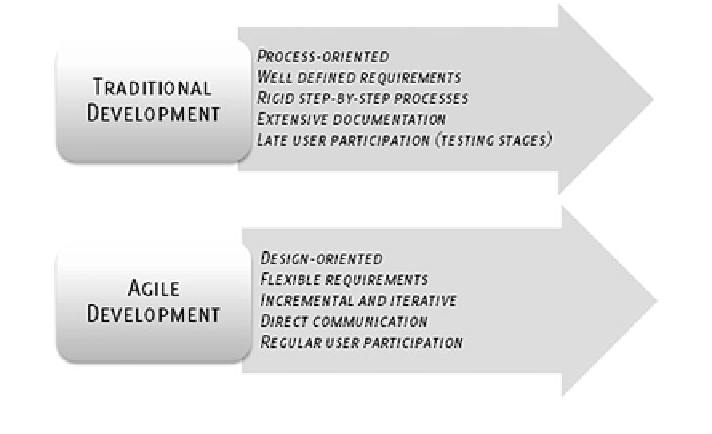Information Technology Reference
In-Depth Information
to as many different projects as possible. This led some researchers and developers
alike to
find such methods inadequate for the
fluid nature of development projects
(Hardy et al.
1995
).
As IT and IS became more complex, developing projects were increasingly
constrained by external factors such as budgetary and time limits, unstable user
requirements, and the constant evolution of available technology (Tumbas and
Matkovic
2006
). Toward the end of the 1990s, a new category of ISDM has
surfaced that is commonly referred to as agile development, and its increasing
popularity has reshaped the research on ISDM during the last decade. The most
popular form of agile development in recent years is the scrum methodology
(VersionOne
2013
), which is particularly
flexible and can account for requirement
changes at any point of the process, making it
ideal for commercial projects
(Fig.
1.3
).
Avison and Taylor (
1997
) classify the different ISDM according to
five different
types, which are ultimately based on the scope of the problem situation that the
system aims at resolving. We have summarized these
findings in Table
1.1
.
ned problems, with clear requirements and
objectives. This class encompasses the more traditional methodologies, which
divide the development process into a given number of stages, starting typically
with analysis of requirements and ending with the product
The
first class consists of well-de
'
final release and
maintenance, with no overlapping between stages (Avison and Taylor
1997
). An
example is the structured systems analysis and design methodology (SSADM). This
methodology follows a set structure of eight stages, starting with strategic planning
and feasibility studies, and ending with production, maintenance, and review of the
s
final product (Goodland and Riha
1999
). Although later alterations can be made, it
is not an incremental methodology, as the product is only released when it is
Fig. 1.3 Traditional versus agile development

Search WWH ::

Custom Search